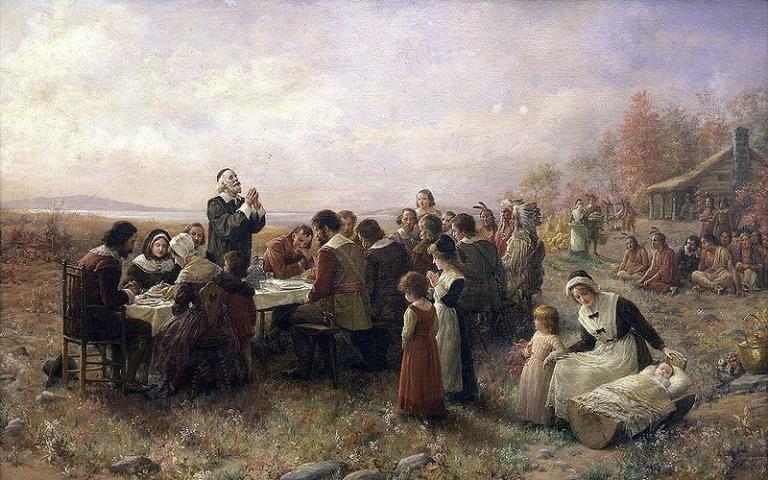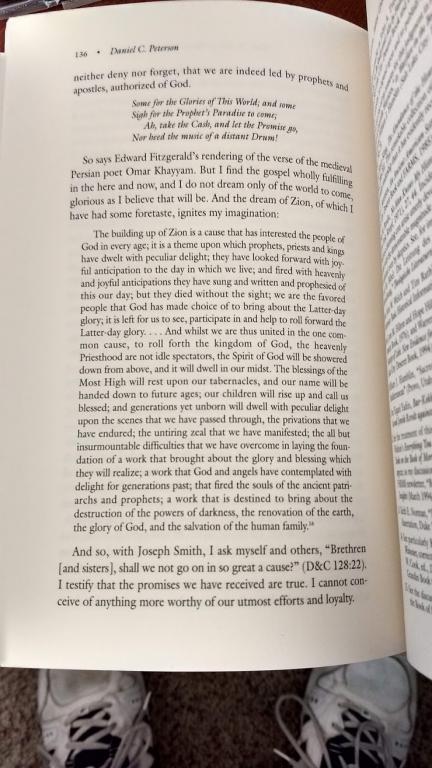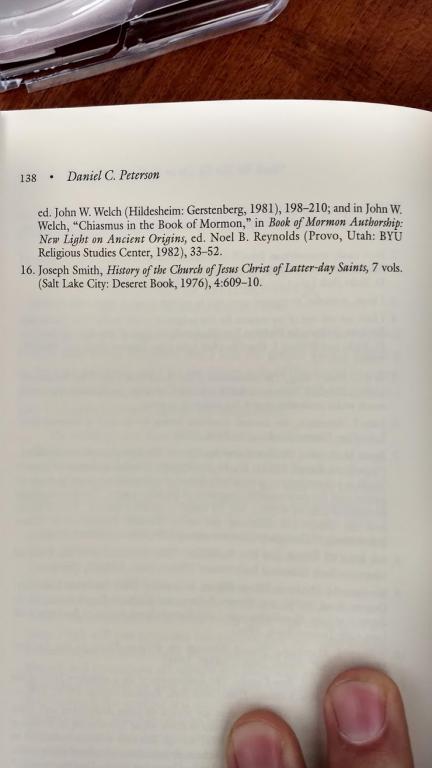
I’ve now managed to locate the conversation (so to speak) about Holocaust victims and the Latter-day Saint practice of vicarious baptisms for the dead to which I alluded in yesterday’s post. It occurred on Tracing the Tribe: The Jewish Genealogy Blog, and it commenced on 17 December 2006. My participation there will serve to illustrate the old adage “Fools rush in, where angels fear to tread.” I post this not to rekindle discussion of the question of vicarious baptism and Holocaust victims, but for the sake of a minor bit of history (including personal history):
http://tracingthetribe.blogspot.com/2006/12/anger-over-baptism-of-simon-wiesenthal.html
My first entry is marked 3:08 PM, and it reads, in toto, as follows:
Some very quick observations from a believing member of the so-called Mormon Church:
(1)
To Rabbi Hier’s remark that “It is sacrilegious for the Mormon faith to desecrate [Simon Wiesenthal’s] memory by suggesting that Jews on their own are not worthy enough to receive G-ds’ eternal blessing,” I would respond that we Latter-day Saints do, quite unapologetically, insist that Jews “are not worthy enough to receive G-d’s eternal blessing” “on their own.”
It’s a fundamental Christian belief that nobody is.
(2)
I don’t believe that I should attempt to dictate Rabbi Hier’s theology. Likewise, I don’t believe that he should attempt to dictate mine.
(3)
For reasons perhaps best known to her, Helen Radkey hates my Church, and is always seeking to do it damage.
(4)
The Church cannot realistically be expected to control what individual members do in terms of submitting names for temple work. It can control what information it offers and encourage or discourage certain things, but it cannot systematically patrol all name-submissions to make sure that they’re not Jewish or that those who bore the names didn’t spend time in a concentration camp.
(5)
Systematically barring work for “Jewish names” would bar many seemingly Jewish names that are, in fact, not Jewish.
(6)
Systematically barring work for Jews that we Latter-day Saints regard as salvific would itself be an act of racist discrimination.
(7)
Systematically barring work for Jews would be an act of injustice towards Mormons with Jewish relatives (e.g., my wife).
(8)
It strikes me as odd that Rabbi Hier and many Jews seem to grant the efficacy of vicarious temple service. I would have expected them to simply brush it aside as, at best, well-intentioned mumbo jumbo.
(9)
I’m not sure why some Jews appear to be offended by Mormon temple service on behalf of Jews. Jews have precious few friends around the world. They should not be seeking to alienate Mormons, who are deeply philosemitic. Is it really not relevant that Mormons typically treat living Jews well, and are, by and large, enthusiastic supporters of Israel?
(10)
If somebody were praying for my conversion, or lighting candles on my behalf, or seeking to baptize me by proxy into some other faith, it wouldn’t bother me in the slightest. I would most likely regard it as an act of intended kindness, however I felt about the faith being “offered” to me.
I’m reminded of a story that I was told many years ago, about Joseph Fielding Smith, a Mormon apostle who ultimately served in the early 1970s as the overall president of the Church, and who was anything but an ecumenist or a theological liberal.
It seems, if the story is true, that his daughter went to Holy Cross Hospital (a Roman Catholic institution) in Salt Lake City to have a baby. There were complications, and it was feared for a short time that the baby might die. So, as good Catholics are wont to do in such cases, the nurses baptized the baby.
Elder Smith’s daughter was very upset when she eventually learned of the baptism, and expressed her concern to her father.
“Don’t worry, dear,” he chuckled. “It’ll wash off.”
I’m sure he saw the baptism as a kindly, well-intended action performed by faithful people whose faith he didn’t share. That’s all.
I suppose that he could have huffed and puffed and screeched that it was an insult to make his grandbaby a Catholic. But he didn’t believe that it was an insult. And he didn’t believe that it had made his grandchild into a Roman Catholic.
(11)
My father participated, as a member of the 11th Armored Division, in the liberation of the Nazi death camp at Mauthausen, Austria — the camp in which Simon Wiesenthal was a prisoner. It was a life-transforming experience for my father. His specialty was aerial-reconnaissance photo-interpretation, which was in relatively little demand at the very conclusion of the war, and so one of his duties after the camp’s liberation was to photographically document Nazi crimes there. He organized a display of those photographs in the city square of nearby Linz, as an early effort at de-Nazification of the populace, under the title of “Nazi-Kultur.” (They are unspeakably horrific and gruesome.) My brother and I have been preparing a complete set of copies of those photographs for donation to the Simon Wiesenthal Center in Los Angeles.
I find it deeply ironic, in that light, that my father’s, my brother’s, and my faith is now being depicted by certain rabblerousers as an insult to the memory of Simon Wiesenthal.
(12)
I hope that Jews, of all people, will be very careful not to entertain the kind of religious hatred and bigotry that some will undoubtedly attempt to inflame over this issue (and that is already evident in some of the comments by other posters above).
The last paragraph was an acknowledgment of the fact that, already at that early point of the exchange, the “discussion” had been largely taken over by bitter enemies of the Church of Jesus Christ of Latter-day Saints who had no discernible connection with Jews or Judaism. That fact rapidly became even more obvious. And, as soon as I appeared, intense antipathy toward me personally became a recurrent theme, as well.
For some reason, most of the comments (though not all of them) now appear as written by “Anonymous.” Still, based on a quick skim through the thread, I appear to have posted again at 5:03 PM.
Then, on the next day, at
10:57 AM
11:20 AM
12:12 PM
12:45 PM
1:49 PM
2:13 PM
2:23 PM
2:49 PM
3:27 PM
6:48 PM
12:19 PM
12:26 PM
2:06 PM
3:42 PM
4:03 PM
11:06 AM
11:26 AM
12:32 PM
1:18 PM
5:34 PM
9:47 PM
Too much time, obviously. But it was Christmas vacation, and I was almost certainly taking breaks from reading student papers and grading final examinations. Having invested so much effort in the exchange, though, I’m not unhappy to have found it again and to make it available to any with a taste for the bizarre and the bitter. Although — I haven’t re-read it in detail yet — there might be places where I would change a formulation slightly, I stand by the position that I articulated there fourteen years ago.
Two observations:
Ever since this exchange, my Malevolent Stalker has suggested that I harbor anti-Semitism and disdain for Jews. He does so on the basis of my having written that “Latter-day Saints do, quite unapologetically, insist that Jews ‘are not worthy enough to receive G-d’s eternal blessing “on their own.”‘” I do not recall his ever including the sentence that follows immediately thereafter: “It’s a fundamental Christian belief that nobody is.”
The other sentence that he’s repeatedly used to brand me as an anti-Jewish bigot over the past fourteen years is my observation that “Jews have precious few friends around the world.” He claims to believe that it was an anti-Semitic taunt and a threat. I was aware of his abuse of the observation already back in December of 2016, and I addressed it in my final comment on the thread, at 9:47 PM on 19 December (?):
In my first post here, I commented, among other things, that “Jews have precious few friends around the world.”
I see on at least two zealously anti-Mormon message boards that that comment is being taken as clear evidence of my alleged anti-Semitism.
I suspect that Jewish readers here (if there are any) will have taken it in the spirit in which it was intended, which was precisely the opposite of the way in which my detractors here and elsewhere have wanted to see it.
As an Arabist, I’m painfully aware of the virulently anti-Jewish propaganda and attitudes that have been spreading for years throughout the rapidly-growing and rapidly-radicalizing Muslim world. As someone who has lived in Europe, travels there frequently, and tries to keep up on intellectual, cultural, and political trends in several of the European languages, I’m also acutely aware of the rise of (real) anti-Semitism there, and of the often somewhat irrational hostility to Israel that seems to be running rampant not only among skinheads but also among some of the elite political, cultural, and intellectual strata. I’ve also noticed a rise in anti-Semitism in certain portions of the African-American community. I find this all deeply distressing.
That was what I had in mind.
Anything but “anti-Semitic” . . . as I trust Jewish readers of my comments here to understand.
There is simply no good excuse for continuing to exploit that observation as evidence that I’m a religious bigot and an anti-Semite. Which, I know, will not dissuade my Malevolent Stalker from so exploiting it.
Please note, too, the comments by David Bokovoy at 12:26 PM and 3:43 PM (presumably posted on 18 December 2006, the next day), and at 8:36 AM (on 19 December?). David was, at the time, still an active and believing Latter-day Saint who had recently finished or was just completing his doctorate in Hebrew Bible at the noted greater-Boston Jewish institution Brandeis University. I also appreciated the “Anonymous” comment at 4:23 PM (18 December?).























